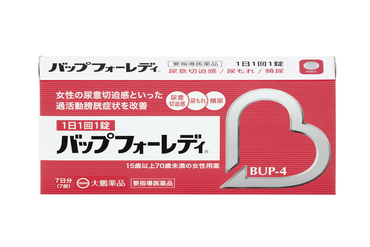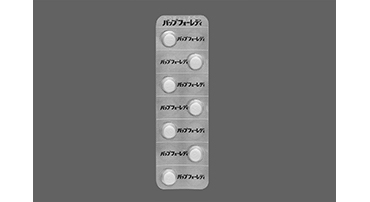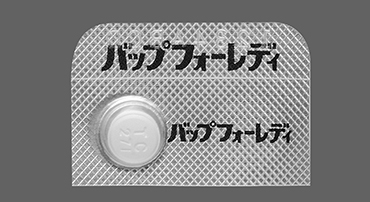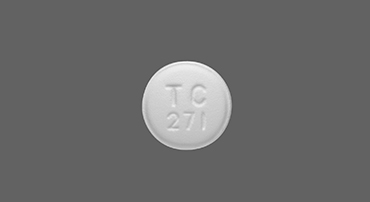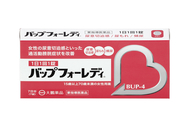BUP-4 LADY
Drugs requiring guidance
- The first OTC drug with an indication for urinary urgency.
- This medicine contains an active pharmaceutical ingredient, Propiverine hydrochloride, and controls abnormal contraction of bladder by both anticholinergic and calcium antagonistic activities.
- One tablet once a day. The small tablet makes it easy to swallow.
| Packaging | Manufacturer's suggested retail price |
| 7 tablets |
JPY 2,750 (JPY 2,500 excluding tax) |
|---|
CHARACTERISTICS
BUP-4 LADY is a female-only drug that controls abnormal contraction of bladder,
and improves urinary frequency and urinary incontinence accompanied by urinary urgency.
BUP-4 LADY can improve daily activities that are impaired by overactive bladder symptoms.
INDICATIONS
urinary urgency (intolerable complaints that urine needs to be used abruptly), urinary frequency with urgency (more frequent urination), and urinary leak
DOSAGE AND ADMINISTRATION
Adult females (aged 15 and over and under 70) should take one tablet once a day after meals.
|
Year Age |
Single dose |
Maximum Doses Per 24 Hours |
|
Adult women (over 15 years old, under 70 years old) |
1 tablet |
Once |
|
Adult women (over 70 years of age) |
Do not take |
|
|
Adult male (15 years of age and above) |
||
|
Small Children (under 15 years of age) |
||
〈Precautions for dose and administration〉
(1)Strictly follow the dose and administration.
(2) Take this medicine at the same time of the day each time.
(3)How to take out the tablet: Strongly push the convex part of the PTP sheet containing the tablet with the fingertip to break the aluminum foil on the back surface and take out the tablet (accidentally swallow the tablet, which may lead to an unexpected accident such as sticking it into the esophageal mucosa).
PRECAUTIONS FOR USE
Following precautions should be observed.
(If not observed, it may aggravate the current symptoms, and adverse reactions and incidents are more likely to occur.)
1. Following persons should not take this medicine.
(1) Persons who have experienced allergic reactions due to this medicine or its ingredients
(2) Male
(3) Women over 70 years of age
(4) Children under 15 years of age
(5) Pregnant or possibly pregnant women
(6) Persons with the following symptoms:
・ Dysuria, urinary retention (hard to urinate, unable to urinate even though there is a need to urinate)
・ Hematuria, painful urination, and bladder pain
(7) Persons who have been diagnosed as follows at medical institutions:
・ Gastric atony (reduced gastric function associated with gastroptosis), intestinal atony (reduced intestinal motility)
・ Blockage of the pyloric and intestinal tract
・ Parkinson's disease, cerebrovascular disorders (cerebral infarction, cerebral hemorrhage, etc.)
・ Glaucoma; Dementia; Myasthenia gravis; Serious heart disease
2. Do not take any of thefollowing medicines while you are taking this medicine.
Pain relief/antispasmodic medicine for stomach; Other gastrointestinal medicines containing scopolia extract; Medicines for motion sickness; Oral medication for rhinitis; Cold medicine
3. Do not drive a car or operate machinery after taking this medicine.
(Symptoms such as sleepiness, blurred vision, and abnormal dizziness may occur.)
4. People who are breastfeeding should either not take this medicine or avoid breastfeeding while taking this medicine.
5. Do not take this medicine for a long time.
Consultation
1. The following persons should consult a doctor or pharmacist before taking this medicine.
(1) Persons under treatment by a physician.
(2) Elderly people (over 65 years of age)
(3) Persons who have experienced allergic reactions due to any drugs.
(4) Persons with the following symptoms:
・ Acute symptoms of frequent urination or urinary incontinence(within 1 month after onset).
・ People only with nocturnal frequency and no frequent urination during the day.
(5) Persons with a diagnosis of arrhythmia, liver dysfunction, renal impairment, ulcerative colitis, or hyperthyroidism.
(6) Persons who have had dysuria, urinary retention, hematuria, painful urination or bladder pain symptoms (those who still have symptoms should not take this medicine).
(7) Persons who have undergone pelvic surgery for uterine cancer, rectal cancer, etc.
2. The following symptoms may be adverse reactions to this medicine. If any of these symptoms occur after taking this medicine, discontinue the use of this medicine immediately, and consult your doctor or pharmacist with this document.
|
Affected body system |
Symptoms |
|
Skin |
Rash/redness, itchiness, urticaria |
|
Digestive organs |
Loss of appetite, nausea/vomiting, abdominal pain, indigestion, stomatitis |
|
Psychoneurotic |
Headache, dizziness, feeling of weakness, numbness, weakness in legs, reduced stride length, shivering of hands and feet, reduced consciousness, and disorientation |
|
Circulatory organs |
Palpitation, chest distress, elevated blood pressure, disturbed pulse |
|
Urinary organs |
Dysuria and feeling of residual urine |
|
Other |
Slurred speech, tongue pain, sore throat, hoarseness, taste disorder, phlegm in throat, lower back pain, dry eyes, abnormal brightness, oedema, and general malaise. |
3. Rarely, the following serious symptoms occur after taking this medicine. As they may be adverse reactions, discontinue the use of this medicine immediately, and consult a doctor with this document.
|
Name of the symptom |
Symptoms |
|
Urinary retention |
A painful condition in which the person has the urge to urinate but cannot urinate. |
|
Hallucination, delirium |
A feeling that there is something that does not actually exist, and deterioration of attention, cognition, and cognitive function may appear. |
|
Acute glaucoma attack |
Sudden nausea, ocular pain with headache, difficulty in eyes, etc. may occur. |
|
Paralytic ileus (intestinal occlusion-like symptoms) |
Severe abdominal pain, cessation of gas discharge, vomiting, and significant constipation accompanied by a feeling of bloating of the abdomen appear. |
|
Rhabdomyolysis |
Muscle pain of hands, feet, shoulders, and lower back, numbness of hands and feet, lack of force, stiffness, general malaise, and reddish brown urine, etc. may appear. |
|
Renal dysfunction |
Fever, rash, decreased urine output, general edema, general malaise, arthralgia (joint pain), diarrhea, etc. may occur. |
|
Hepatic dysfunction |
Fever, itchiness, rash, jaundice (the skin and whites of the eyes turn yellow), brown urine, general malaise, loss of appetite, etc. may occur. |
|
Platelet reduction |
Bleeding symptoms such as nasal bleeding, bleeding gums, and bruising may occur due to a decrease in the number of platelets that are components in the blood. |
|
Mucocutaneous-ocular syndrome (Stevens-Johnson Syndrome) |
High fever, red eyes, rheum, erosion of lips, sore throat, rash/redness of large areas of skin, etc. may persist or worsen rapidly. |
|
QT prolongation; ventricular tachycardia |
Dizziness, palpitation, chest pain, increased heart rate, and loss of consciousness may occur. |
4. The following symptoms may occur after taking this medicine. If any of these symptoms persist or increase, discontinue the use of this medicine and consult your doctor or pharmacist with this document.
Dry mouth, constipation, diarrhea, sleepiness, blurred eyes, temporary forgetfulness
5. If symptoms do not improve after using this medicine for 2 weeks, discontinue the use of this medicine and consult your doctor or pharmacist with this document.
ACTIVE INGREDIENTS
In 1 tablet:
Propiverine hydrochloride ......10 mg
Inactive ingredients:
Lactose hydrate, Crystalline cellulose, Hydroxypropyl starch, Carmellose Ca, Hypromellose, Talc, Macrogol 6000, Titanium oxide, Mg stearate, and Carnauba wax.
PRECAUTIONS FOR STORAGE AND HANDLING
- Store in a cool and dry place, away from direct sunlight.
- Keep out of the reach of children.
- Do not transfer to other containers(It may cause misuse or change the quality).
- Do not take the product past the expiration date. The expiration date is indicated on the outer packaging.
FOR FURTHER INFORMATION
|
Manufacturer and distributor |
Taiho Pharmaceutical Co.,Ltd. |
|
Dosage form |
Tablets |
|
Packaging unit |
7 tablets |
|
JAN code |
4987117614008 |
|
Expiration date |
3 years |
CONTACT
For inquiries, please contact the shop where you purchased the product or the following:
Manufacturer and distributor
Contact: Customer Relations Office, Taiho Pharmaceutical Co., Ltd.
1-27 Kanda Nishiki-cho, Chiyoda-ku, Tokyo, 101-8444, Japan
Phone: 0120-4527-66
Business hours: 9:00 to 17:00 (Excluding weekends and holidays)
Website: https://www.taiho.co.jp/
BUP-4 LADY
- TOP
- Consumer Healthcare Products
- BUP-4 LADY


